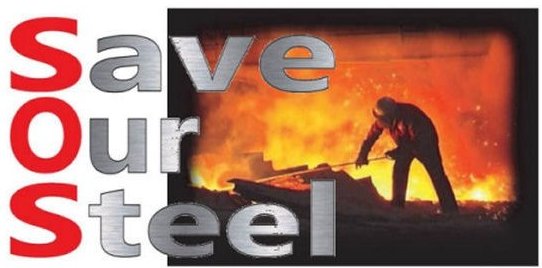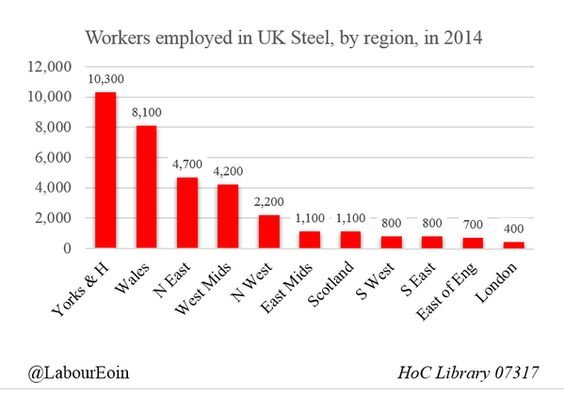
|
April 21, 2016 The Steel Crisis in Britain No to the EU of the Monopolies! |
In fact, Britain exported 8.6 million tonnes while at the same time importing 7.4 million tonnes of steel that year. More than half, 4.7 million tonnes, of these imports come from Europe. Only a small fraction, 690,000 tonnes, came from China.
Britain, exporting more steel than it imports, has the potential to produce all the steel required by the national economy. Any surplus or deficit in production could be traded with other countries in a planned and controlled manner to the benefit of both Britain and its trading partners. In conditions of unrestricted monopoly-controlled trade, with local production competing with global production, to import such large quantities leaves the industry and the economy as a whole exposed to the full brunt of the markets. Furthermore, the closure of plants seriously erodes the self-reliant potential of the economy.
The root cause of the British steel crisis is the lack of any control over the economy and its direction by the workers and people of Britain. National chauvinist cries that Britain is under the dictate of foreign interests are a smokescreen to hide this fundamental issue and for Britain's own imperial motives.
The empire-building project that is the EU of the monopolies - itself in profound crisis - originated in the European Coal and Steel Community (ECSC) for control of European steel production for geopolitical ends, at that time in the context of the Cold War as well as in competition with US imperialism. It has always had this character and remains set against the development of self-reliant, sovereign local economies. Thus any serious emergency measures and long-term plans to safeguard and develop a national steel industry, particularly those that restrict the operations of the monopolies, are forbidden under EU competition laws.
This underlines that Britain should exit from all
empire-building trading and geopolitical blocs such as the EU, not to
"go it alone" and pursue its own imperial aims, or tie itself further
to the US, but to develop a sustainable economy aimed at meeting the
needs of the population in as self-reliant a manner as possible, with
international trade conducted on a planned basis
only where necessary according to the principle of mutual benefit. In
such a situation, neither would the cheapest steel on the market, nor
the imposition of tariffs, be an issue. To get drawn
into rivalries between powers and monopolies over whether, say, it is
better to buy Chinese or buy from the EU is a dangerous path beginning
with national chauvinism and ending with
open conflict.
(April 16, 2016)
The Steel Industry Is a Vital Part of the Economy!
It Must Not Be Destroyed!
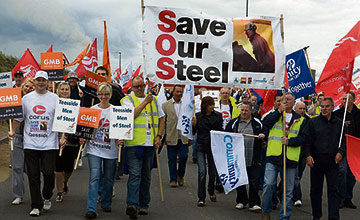
The announcement of Tata Steel at the end of March that
it was seeking a buyer for its steel plants in Wales, Scotland and
England, and that it had rejected a turnaround plan for its
Port Talbot site, was a further devastating blow to the steel industry
in Britain. The fight is on to prevent this steel industry being wiped
out altogether on the altar of imperialist "free
trade". Steel workers, with the support of many sections of working
people, are rallying to this fight. They are becoming increasingly
aware that "trade wars" bring nothing but disaster, and
what is required to turn things around is the independent programme and
action of the working class to bring about a human-centred economy from
its present direction of serving
monopoly right.
The fight to save the steel industry is in some ways
reminiscent of the fight to safeguard the future of the health service.
For many years the neo-liberal agenda has gained
momentum. With the health service, successive governments have taken it
through a series of watersheds which have been decried as the end of a
health service serving the claims of the
people for health care as of right. With the steel industry, its
destruction, privatisation and abandonment began in earnest under
Margaret Thatcher and Ian McGregor, with the mantras that
the industry needed massive restructuring and cut-backs. Such was their
success, the same team turned to the destruction of the coal industry.
Since then there have been successive closures
and take-overs in the steel industry, all under the banner of
neo-liberal "free trade", "commercial decision-making", being
"competitive in the global marketplace", "globalisation" and the
like.
Various unions and other voices on behalf of working people have called for nationalisation or temporary nationalisation of the steel industry, and the government has so far refused. There is a need for steel in all sectors of the economy, but the government does no more than pay lip-service at best to this requirement. The neo-liberal outlook takes no cognisance of what a balanced economy serving the people's needs should be like. Nor does it pay heed to the dignity of labour and the life of communities. If an industry cannot compete, let it go to the wall, accompanied by many crocodile tears and assertions that the government is doing all it can. The conception of a national sovereign economy serving the people's needs is itself thrown on the scrap-heap. Nor does it matter in terms of the neo-liberal outlook and programme that the workers have continued to make concession after concession in the name of keeping the steel industry producing and "competitive".
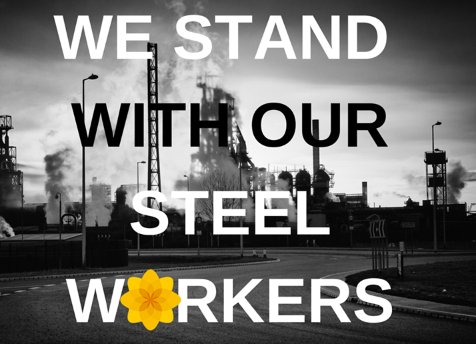 For decade after decade
now, successive governments
have been warned of the damage to the economies of Wales, Scotland and
of Britain as a whole with the decimation of the steel
industry. At the time of Thatcher, there was still the British Steel
Corporation when Ian McGregor was appointed in 1980 as its chair. In
the hey-day of the social welfare state, the British
Steel Corporation had brought into state ownership 90% of British
steel-making in 1967. Under McGregor, the industry was "restructured"
and then privatised in order, it was claimed, for
the industry to survive, and the workforce was more than halved from
268,500 to 130,000. This was not without a bitter battle by the
steelworkers who fought against the dismantling of the
industry with a 13-week national strike.
For decade after decade
now, successive governments
have been warned of the damage to the economies of Wales, Scotland and
of Britain as a whole with the decimation of the steel
industry. At the time of Thatcher, there was still the British Steel
Corporation when Ian McGregor was appointed in 1980 as its chair. In
the hey-day of the social welfare state, the British
Steel Corporation had brought into state ownership 90% of British
steel-making in 1967. Under McGregor, the industry was "restructured"
and then privatised in order, it was claimed, for
the industry to survive, and the workforce was more than halved from
268,500 to 130,000. This was not without a bitter battle by the
steelworkers who fought against the dismantling of the
industry with a 13-week national strike.
The inexorable process of mergers, take-overs and closures proceeded with the merger of British Steel and Hoogovens in October 1999 to become Corus, at the time Europe's biggest steel company and the world's third largest steel producer. Yet this meant 10,000 steel workers in Britain losing their jobs in the name of "terrific cost savings in overhead costs, purchase, logistics and adjusted best practices". But the results were plummeting stock market valuations, opposition from the steel workers to a pay-the-rich orientation and job losses and a drop in productivity.
Tata of India acquired the Corus Group in April 2007, which was named Tata Steel Europe in September 2010. At its formation, Corus operated primary steelmaking plants (blast furnaces) in Port Talbot, Wales, and Scunthorpe and Teesside in England, as well as IJmuiden in the Netherlands, with additional steelmaking facilities in Rotherham (electric arc furnace), as well as downstream steel production of both long and flat steel. The Teesside plant was mothballed and sold in 2009/2010. The long products division was offered for sale in 2015, with preliminary agreement reached with Greybull Capital in 2016 for acquisition of most of Tata Steel Europe's long product units.
In this context, it can be seen that to lay the blame for Tata's decision on the "dumping" of Chinese steel is completely misguided. If the steel industry were run to serve the needs of the economy, then the issue would not be to ascertain where the cheapest steel could be bought from. If international trade were conducted not on the basis of neo-liberal imperialist "free trade", but from the motive of trade for mutual benefit and building a human-centred economy, then the cheapest steel on the international market would not be the decisive consideration. Nor would it be a question of imposing import tariffs, as if the economy could not be put under conscious control. Decisions are being taken on the steel industry in Britain which are not under the control of any public authority in this country. And the government claims it cannot intervene to rectify this situation. Decision-making must lie in the hands of a public authority here, whether that is for Wales, Scotland or the economy of Britain as a whole, and not in the hands of the monopolies of the European Union or anywhere else.
In terms of international trade, the alternative lies in affirming the sovereignty of each state's public authority over the direction of its economy and society as a whole. On that basis, the people of each country can develop their co-operation and unity which expresses their interests and not that of the monopolies; on that basis sovereign peoples can develop their own institutions of international mutual benefit.
The workers' movement must
reject the call to direct
their anger against China, and direct it instead against the ruling
elite in Britain who are absolving themselves of any
responsibility for the steel industry or the health of the economy, or
indeed public services. They are demonstrating that they could not care
less about these considerations. In particular,
they could not care less about the fate of working people with their
decisions. What matters to them is what is termed "commercial
viability", obtaining the cheapest deals, worming their
way into opportunities in the world market, and so on.
And what has this outlook demonstrated since 1980? The complete wrecking of the economy, disregard of the claims of working people and unravelling of the social fabric. Particularly obnoxious in this respect are the chauvinist claims that the government is being dictated to by foreign interests, when the issue is actually that it is refusing to build a sovereign economy at home. Let working people here decide the direction of the steel industry and the economy as a whole, and let them give support to other countries making their own decisions and building their own sovereign economies! How many economies has Britain itself wrecked with its colonial and neo-colonial projects and its imperialist free trade! The "freedoms" it claims, for instance the "free movement of capital, goods, services and labour" are not to create jobs, spur investment and promote economic growth as neo-liberalism asserts, but to preserve the dominance of the global monopolies and the financial oligarchy.
Of concern also to the steel-workers is the talk about
the "pension liabilities", which means that the government puts the
rightful claims of the workers to their pensions to the bottom
of its concerns. Business Secretary Sajid Javid has said that the
government rules out taking responsibility for the workers' pensions,
and the contravention of EU law has been cited as the
reason. Indeed, EU competition law is firmly against any restructuring
or rescue packages from governments that are aimed to support companies
facing financial difficulties or collapse.
It is becoming increasingly glaring that the campaign to Save Our Steel means that the working class has to take an alternative, independent stand on these matters. Workers must not get into these squabbles for instance about whether Chinese steel or EU steel is better or is the cause of undermining the steel industry here. Workers must take the stand that what is required are sovereign economies, and a steel industry that serves the socialised economy. There are many projects, such as rail and construction which require a thriving steel industry. The government is and has been refusing to make the emergency and long-term investments which the industry needs. The working class must draw the conclusion that the social economy must be brought under the control of those who live, work and produce for it if it is going to be capable of uninterrupted extended reproduction, where more is put into the economy than is taken out and the people's wellbeing is put as the motive force of the economy.
A new direction is needed for the economy with a
thriving steel industry at its centre. Public control is needed over
the steel industry, control by the actual producers. The Workers'
Opposition must fight for and create public opinion for this new
direction. The working class as a whole must reject the neo-liberal
agenda and take the stand that their fate is in their own
hands. Save Our Steel! For a New Direction for the Economy!
(April 2, 2016)
The Crisis in the Steel Industry Continues as
Port Talbot and Other Plants Face Job Losses:
Invest in Steel, For a New Direction for the Economy!
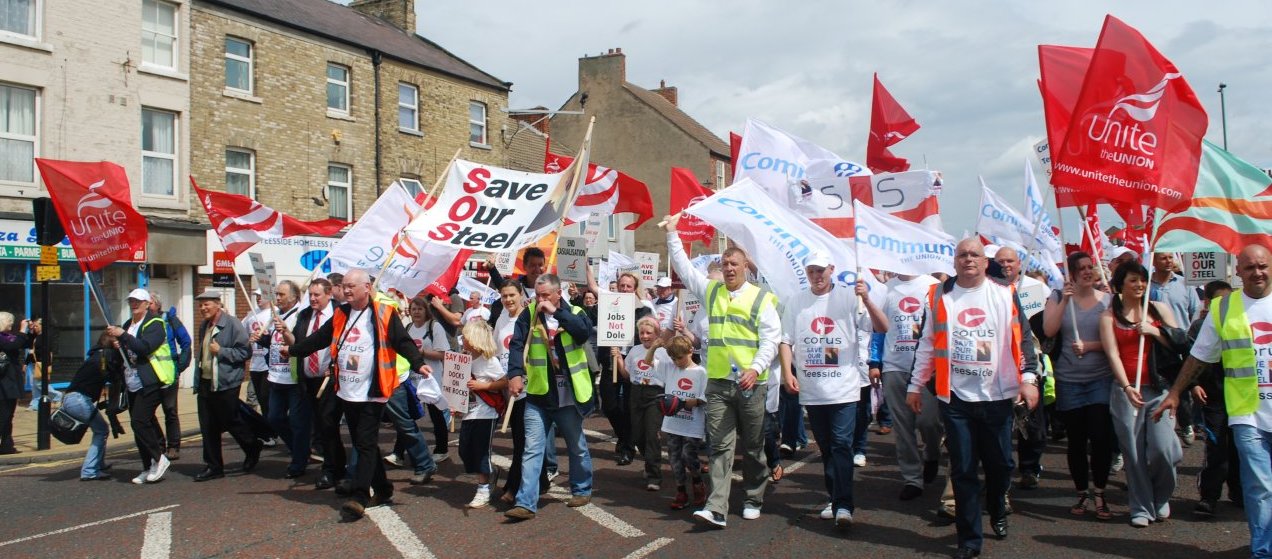
Militant demonstration of Redcar steelworkers, July 18 2009
Steel production in Britain suffered a further blow in January when the monopoly Tata cut 1,050 jobs, three quarters in Port Talbot, south Wales. That comes on top of 1,200 redundancies made by Tata in October in Scunthorpe and Lanarkshire.
So far, 5,000 jobs in the industry have been destroyed over the past year out of 30,000. This will cost the communities affected dearly in lost productive capacity, removing vast sums of value in the form of wages from local economies, further decimating whole towns and communities, and deepening the crisis in the British economy in general.
Unite [union] assistant general secretary for manufacturing Tony Burke said on January 12: "These figures are deeply worrying and show that [government Minister] George Osborne's promise to rebalance the economy is becoming an ever distant pipe-dream. As we saw with closure of the steel works in Redcar, the government's laissez faire approach damages communities and strips out decent well paid jobs from the economy. With steel communities across the UK facing uncertainty and as the storm clouds grow in the global economy we urge the government to adopt an active industrial strategy with steel at its heart."
A modern socialised economy, with its interconnected large-scale production, comes into contradiction with the private ownership of the means of production. When looked at with a human-centred perspective, with the aim of meeting the material and cultural needs of the population, these conditions pose as a matter of necessity the development of sovereign, self-reliant national economies that trade with each other for mutual benefit. This is the opposite of the motivation of the economy of Britain, taken as a whole, in which parasitism, the urge for a quick score, and competition in the global economy hold sway.
It is clear that an economy cannot be built to ensure
the claims of society on it without a manufacturing base, which
requires basic materials such as steel. There is still a huge
requirement for steel and this will continue into the foreseeable
future. Even where steel is being replaced by new materials, such as
certain components in vehicle manufacture which are
now made of carbon fibre, steel is still ubiquitous, not least in
machinery and infrastructure. Steel remains a basic necessity for the
functioning of the economy.
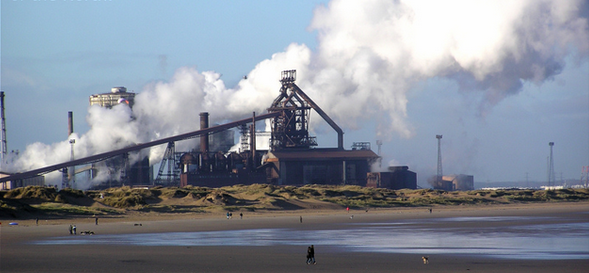
Redcar steel works prior its closure in 2015
After writing off Redcar, Industry and Business Minister Anna Soubry said that "the priority is securing Port Talbot and making sure that Scunthorpe survives". Only recently, she led the Conservative counter-argument in the House of Commons debate of January 13 on trade, that there is too much steel on the market and that the opposition should "get real". The reasons put were that it would be loss-making, asking why anyone would invest. The whole point of steel's significance for the present and future economy was either missed or dismissed.
This narrow market-led view is promoted by media pundits. Reporting on the redundancies at Port Talbot, for example, the BBC claim that the British steel industry is struggling to be "competitive". "But it is fighting against global forces including cheap imports from China," wrote business correspondent Brian Meechan. "The steel industry has not really recovered from the financial crash in 2008 when at its height people stopped buying white goods, cars, and construction stopped."
These are markets dominated by the monopoles, and also under the sway of massive speculation and manipulation. They are experiencing all kinds of chaotic movements, particularly in this time of extended crisis. These problems in the prices of commodities and currencies are also used for various ends in world politics, to accuse and isolate particular countries, enact protectionist measures as part of trade wars and so on, further contributing to disequilibrium. The European Union of the monopolies is also responsible, since its origins and preliminary organisations like the Common Market and Iron and Steel Trades Federation were based on control of strategic European steel production. The EU is against sovereign countries and economies from developing their self-reliant balanced economies. It prefers balancing to be carried out across the EU and dominated in a one-sided manner, in particular by the strongest economies like Germany, France and Britain. With this aim, EU regulations have long prevented governments from propping-up "ailing" or unprofitable industry, regardless of how vital they are.
Furthermore, it should be remembered that the destruction of the coal and steel industries began in earnest with the rise of neo-liberalism in the days of Margaret Thatcher. The so-called "laissez-faire" of neo-liberalism meant the unbridled rule of the monopolies. Under Thatcher, in fact, the interests of the national economy were over-ruled, despite all the chauvinism associated with her and her ideology.
Osborne promised a "balanced" economy. What would this mean? First of all, a "balanced" economy would have to be human-centred. There must be planned control of market prices and planning over all aspects of international trade. This means restricting the monopolies who already exert such power for their private empire-building interests.
A harmonious economy cannot come about if the economy is fragmented into mutually antagonistic, competing parts. Association has to supersede competition. In other words, instead of anarchy, competition and being subject to the market, human, conscious control over the economy is required, meaning planning, with the aim of meeting the needs of the population. Instead a completely different direction is evident in the monopoly-controlled economy which bears all the hall-marks of the domination of private interests, of irrationality and the demand that everything must serve to counter the falling rate of profit.
This is summed up in the need for a change in direction, for an economy where the steel industry is an integral part of the social economy. In the immediate present, the government must be held to account for its wilful failure to safeguard the steel industry. The proletarian front, led by the Workers' Opposition, must fight to safeguard the future of the steel industry and the whole manufacturing base. It must do this by strengthening its organised resistance to the wrecking of the economy by the ruling elite. This organised resistance gives rise to a glimpse of the future in which the people themselves gain sovereign control of their economy in general and the steel industry in particular.
The government must be held to account over its refusal
to accept its responsibility to safeguard the future of the industry.
The crisis in manufacturing underlines the necessity for the
working class to develop its independent programme and action to bring
about a sovereign economy under its control and end the parasitism of
the monopolies and financial oligarchy. To
take steps in this direction, monopoly right must be restricted and a
fight take place for a new direction for the economy.
(January 30, 2016)
The Accusation of Chinese Steel "Dumping"
The government and media are making the claim that British steel production is facing a combined hit of weak demand, a strong pound, high energy prices and, in particular, dumping of cheap steel from China, which, it is claimed, is overproducing as its economy slows down. Nothing is mentioned of the situation whereby Britain exports 8.6 million tonnes of steel while simultaneously importing 7.4 million tonnes.
While it is true that Britain imported 687,000 tonnes of steel from China in 2014, more than double the 303,000 tonnes in 2013, Britain imported nearly seven times as much steel, 4.7 million tonnes, from Europe. Prices in 2014 averaged at 897 Euros a tonne for EU steel imports, one and a half times more than the 583 Euros a tonne for Chinese steel.
In response, Shen Danyang, spokesman for the Chinese Ministry of Commerce, said that it makes no sense to accuse Chinese steel producers of dumping in the global market, citing falling world iron prices as an underlying cause. He pointed out that the import price into China for iron ore in the first eight months of 2014 had dropped sharply from $110 to $63 per tonne.
The reality is that steel production in Britain has been wound down for many years. In the 1980s, the steelworkers fought a bitter battle against the dismantling of the industry in a 13-week national strike. Margaret Thatcher brought in the "butcher of coal, steel and cars", the infamous American magnate, Ian MacGregor, to oversee this destruction, which more than halved the workforce from 268,500 to 130,000.
The famous steel town of Corby was attacked, Ebbw Vale in South Wales closed, the Steel town of Sheffield was wrecked, the famous "Round Oak Steelworks" of the Black Country destroyed and numerous others in Birmingham where the then British Steel, Pressed Steel Fisher and GKN rolling mills were wound down or taken over in and around 1979 and the eighties.
Corus was formed in October 1999 through the merger of British Steel and the Dutch monopoly Koninklijke Hoogovens. In April 2007, Corus itself was taken over and became a subsidiary of Tata Steel, as Tata Steel Europe.
More recently, steel workers have been in action again to save the industry and oppose job losses. The people of Teesside and the Blast Furnace steel workers fought to re-open their steel plant in Redcar after its closure in 2010; it re-opened in 2012 under the ownership of Thai steel company SSI.
The argument that an alternative can be found has not
receded and the resistance deepens. Last October steel workers from
Redcar, Tata and Caparo steel plants marched on parliament
to confront the government over the steel industry closures and massive
loss of employment. The lobby coincided with an opposition-led debate
on the steel industry in the House of
Commons. The motion tabled for the debate, which was defeated by 307 to
280, called for the Government to "publish a full Industrial Strategy,
including what level of capacity the
government envisages is needed in the steel industry, so as to
safeguard this vital strategic asset".
(January 30, 2016)
Read The Marxist-Leninist
Daily
Website: www.cpcml.ca
Email: editor@cpcml.ca
